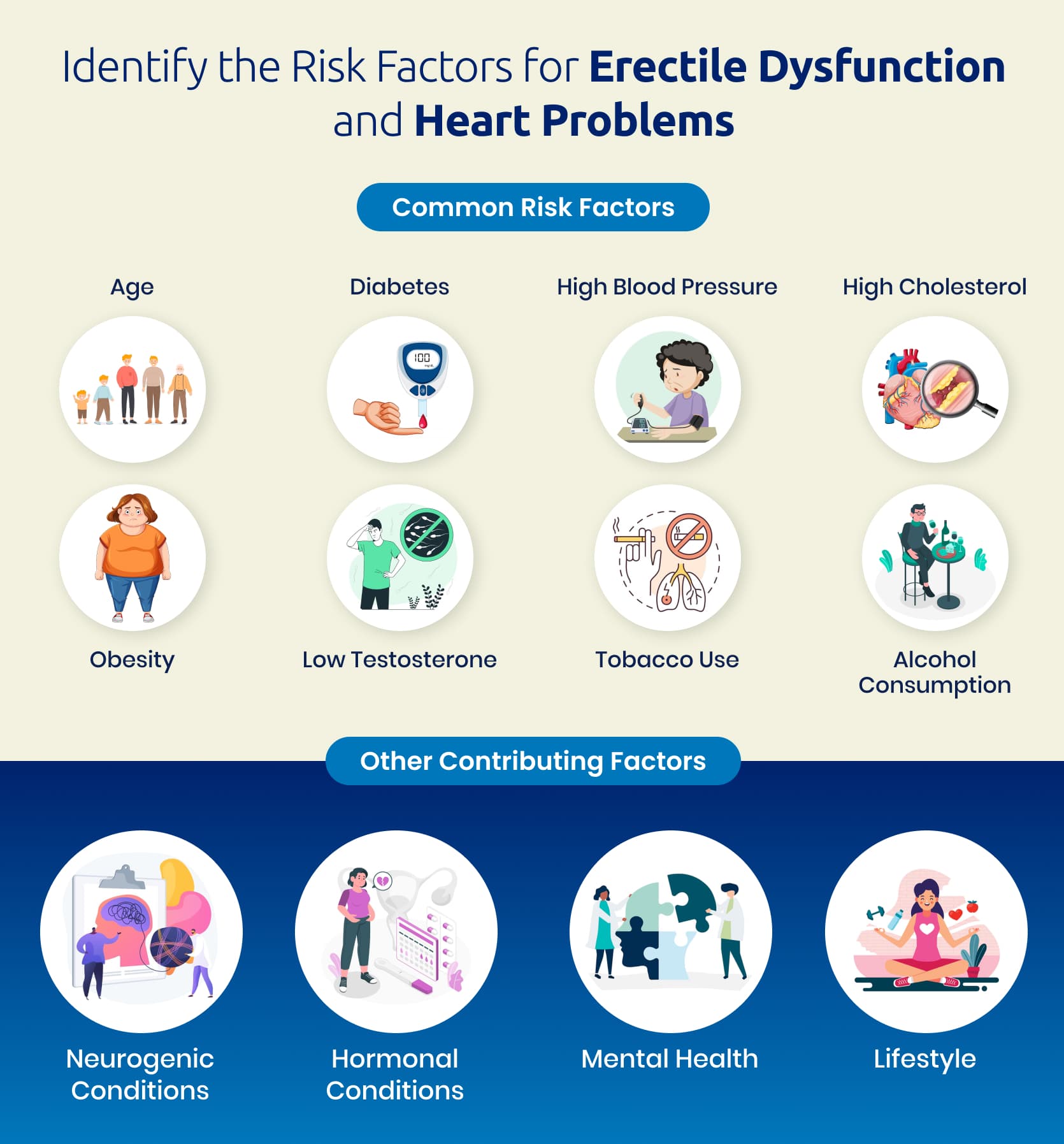
Can Erectile Dysfunction Be a Warning Sign of Heart Problems?
While erectile dysfunction (ED) signifies the inability to achieve and maintain a firm erection, it can sometimes hint at an underlying heart condition.
Take a look at the following blog to understand the connection between erectile dysfunction (ED) and heart problems in men in greater depth.
Mechanism of Erection
The most basic mechanism of erection involves the filling of blood in the penis. This blood flow causes the penis to become swollen and firm. This occurs through the stimulation of certain triggering factors, such as a look, a touch, or even a thought, which causes the brain to send signals through the spinal cord and into the nerves of the penis. This process requires the coordinated function of blood vessels, chemical messengers, hormones, and nerves.
Connecting Erectile Dysfunction to Heart Problems
Among the common causes of erectile dysfunction, past research suggests that the build-up of plaque in the arteries, known as atherosclerosis, is a primary reason for disrupting sufficient blood flow to the penis, making erection difficult. This is how erectile dysfunction can precede heart problems.
However, contemporary experts highlight that dysfunction of the endothelium (cells in the inner lining of blood vessels) and smooth muscle can also disrupt proper blood supply to the heart. As a result, the heart may struggle to provide adequate blood flow to the penis. This is a key factor in the development of erectile dysfunction, which can, in turn, signal an impending heart problem.
Several research studies indicate that many individuals experience ED 3 to 5 years before a heart attack or other cardiovascular event. Men are usually more prone to erectile dysfunction after the age of 40. Additionally, men with ED are at an increased risk of conditions like ischaemic heart disease, stroke, or peripheral artery disease.
Many men often assume erectile dysfunction is purely a psychological issue. However, scientists have debunked this myth, proposing that vascular issues are the most common cause. Below are key aspects to consider when examining the link between erectile dysfunction and heart problems in men:
Discover the Link: Contemporary healthcare specialists suggest that men with coronary heart disease are more likely to experience erectile dysfunction. Adequate blood flow to the penis is crucial for healthy erectile function. Impairments in blood supply due to plaque deposits in arteries, endothelial dysfunction, or even certain high blood pressure medications are directly linked to ED.
An Early Warning Sign: In coronary heart disease, blood vessels may fail to dilate adequately, interrupting blood supply to the penis. Therefore, erectile dysfunction can be an early warning sign of heart problems.
Relation to Diabetes: ED is closely linked to type 2 diabetes. High blood sugar levels can damage nerves and blood vessels, leading to erectile dysfunction. Research surveys indicate that nearly 50% of men with diabetes encounter ED.
Connect the Dots: ED can be an embarrassing issue for many men, leading them to avoid discussing it with healthcare providers. This reluctance can cause them to overlook associated symptoms such as chest pain or shortness of breath. Addressing all symptoms is crucial to diagnosing potential risks of diabetes, high blood pressure, or other heart diseases.
Role of Lifestyle Choices: Lifestyle choices play a significant role in heart health and sexual function. Regular exercise, a balanced diet, and managing blood pressure, cholesterol, and diabetes can reduce the risks of stroke or heart attack. Improved cardiovascular health often leads to more efficient sexual function.
How Frequently Does Erectile Dysfunction Occur?
Approximately 15% of men in their 40s and 50s are at risk of erectile dysfunction, while around 50% of men in their 60s experience it more often. By their 70s, many men become completely dysfunctional in terms of erection.
If you face difficulties achieving or maintaining an erection, remember you are not alone. ED is a common issue affecting hundreds of thousands of men, regardless of age.
Understanding the Link between Hypertension, Medication, and Erection
Research shows that men with erectile dysfunction are about 38% more likely to have high blood pressure than those without ED. Additionally, medications for high blood pressure, such as ACE inhibitors and beta-blockers, can increase the risk of ED.
Identify the Risk Factors

Identify the risk factors for erectile dysfunction and heart problems
Erectile dysfunction and heart problems share several common risk factors:
Age: With increasing age, achieving an erection may take longer and may not be as firm. ED at a younger age can suggest a higher risk of heart disease, particularly in men under 50.
Diabetes: High blood sugar levels increase the risk of both ED and heart disease.
High Blood Pressure: This condition can damage arteries and lead to vascular diseases, affecting sexual function.
High Cholesterol: Elevated levels of LDL cholesterol can lead to atherosclerosis, triggering ED.
Obesity: Excessive body weight is a significant risk factor for heart complications.
Low Testosterone: Low levels of testosterone are linked to frequent ED and cardiovascular issues.
Tobacco Use: Smoking is highly detrimental to heart health and increases the risk of ED.
Alcohol Consumption: Excessive alcohol intake can lead to high cholesterol and high blood pressure, impairing erection.
Other risk factors include neurogenic conditions like Parkinson’s disease, hormonal imbalances like thyroid disorders, anxiety, depression, fatigue, stress, excessive cycling, and drug addiction.
Diagnosing Erectile Dysfunction
Doctors may recommend several diagnostic tests before treatment, including:
- Vascular and cardio-metabolic tests with penile injections
- Non-invasive cardiovascular and penile ultrasound
- Imaging tests
These processes provide a detailed view of heart, penile, and vascular health, helping to uncover hidden conditions related to ED.
Erectile Dysfunction Treatments Related to Heart Issues
Once heart complications are identified, lifestyle changes become essential. Adjusting habits to manage body weight, blood pressure, diabetes, and cholesterol, along with physical activity, can improve both cardiac and penile health. Stopping smoking and reducing alcohol intake are also beneficial.
Medications for erection problems can sometimes alleviate symptoms of chest pain or mild cardiac issues in men. In addition to improving sexual function, these medications can benefit heart health. Your doctor may recommend over-the-counter medicines to treat the condition.
Summary
The best approach to addressing erectile dysfunction and related heart problems is through open communication. Men should feel comfortable discussing ED to fully understand and address the issue. Healthcare experts at MD.co.uk are committed to uncovering the key causes of erectile dysfunction and helping you regain your sexual function. Visit our website for expert advice from top healthcare professionals.

We Are Here!
Mon-Fri from 9am to 5pm




